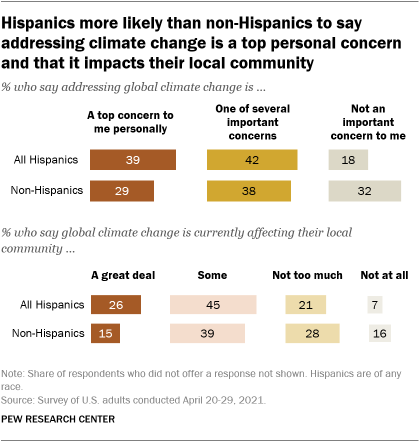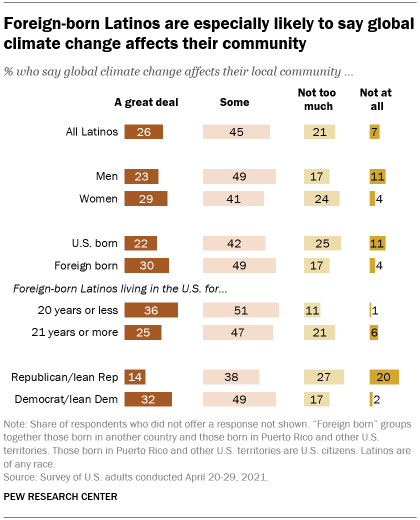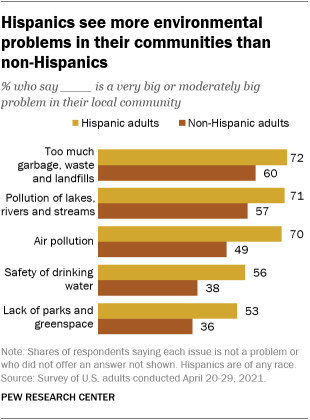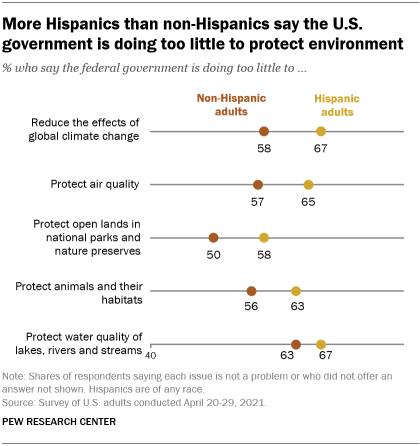Most Latinos in the United States say global climate change is an important concern, with a majority saying that it affects their local community at least some. Latinos broadly support an array of policy measures to address climate change and other environmental issues. And many say they are willing to help by making lifestyle changes, according to a Pew Research Center survey.
About eight-in-ten U.S. Hispanics (81%) say addressing global climate change is either a top concern or one of several important concerns to them personally, with 39% saying it is a top personal concern. By comparison, a lower share of non-Hispanics (67%) say addressing global climate change is at least one of several important concerns, due in large part to a lower share who say it is a top concern (29%). In addition, a greater share of non-Hispanics than Hispanics say addressing global climate change is not an important concern to them (32% vs. 18%).
Pew Research Center conducted this study to understand how Americans – in this case, Latinos – view climate, energy, and environmental issues. 13,749 U.S. adults, including 2,153 Latinos, were surveyed from April 20 to 29, 2021. The survey was offered in both English and Spanish. The terms “Hispanic” and “Latino” are used interchangeably throughout this post. Hispanic refers to anyone who self-identifies as Hispanic or Latino. Hispanics are of any race. For more, read “Who is Hispanic?”
The survey was conducted on Pew Research Center’s American Trends Panel (ATP) and included an oversample of adults ages 18 to 24 from the Ipsos Knowledge Panel. A total of 912 Generation Z adults, born after 1996, were included in the sample.
Respondents on both panels are recruited through national, random sampling of residential addresses. This way nearly all U.S. adults have a chance of selection. The survey is weighted to be representative of the U.S. adult population by gender, race, ethnicity, partisan affiliation, education, and other categories. Read more about the ATP’s methodology.
Here are the questions used for this report, along with responses, and its methodology.
For Hispanics, climate change is not just a global, distant concern. About seven-in-ten Hispanic adults (71%) say climate change is affecting their local community at least some, a higher share than among non-Hispanic adults (54%), the April survey of U.S. adults found.
Some notable differences exist across demographic subgroups, in particular among Latino partisans. The vast majority (81%) of Latino Democrats and Democratic-leaning independents say global climate change is affecting their local community, with roughly one-third (32%) saying the impact is affecting their community a great deal. By contrast, about half (52%) of Latino Republicans and Republican leaners say global climate change affects their local community at least somewhat, with just 14% saying it is having a great impact. Meanwhile, one-in-five Latino Republicans say global climate change does not affect their community at all, a view shared by only 2% of Latino Democrats.
Hispanic adults’ views on the local effects of climate change also vary by nativity. Among Hispanics born in another country, Puerto Rico, or another U.S. territory, about eight-in-ten (79%) say global climate change affects their local community a great deal or some, while 64% of Hispanics born in the 50 states or the District of Columbia say the same. The share increases to 87% among foreign-born Hispanics who have been in the U.S. for 20 years or less, with over a third (36%) saying global climate change affects their community greatly. By comparison, a quarter or less of Hispanics born in the 50 states or D.C. and foreign-born Hispanics who have lived in the country for 21 years or more (22% and 25%, respectively) say the same about their local communities.
Experiences that foreign-born Latinos had in places they lived before moving to the 50 states or D.C. may shape their views on climate change. As climate change makes extreme weather events more common globally, more people leave their homes, according to a 2018 report by the World Bank. Latin America – especially Central America – has been among the top sources of climate migration in recent years. The report estimates the region could see up to 17 million people migrate due to climate change by 2050.
More Hispanics than non-Hispanics say certain environmental issues are a big problem in their local communities. In the survey, participants were asked to assess how big a problem each of the following environmental issues is in their local community: too much garbage, air pollution, pollution of lakes, rivers and streams, safety of drinking water, and lack of parks and greenspace.
The largest differences between Hispanics and non-Hispanics came on air pollution (70% vs. 49%) and safety of drinking water (56% vs. 38%). Hispanics (along with other non-White racial and ethnic groups) are disproportionately affected by air pollution, and are less likely to have access to drinking water that meets federal health standards, according to research by public health experts, climate scientists and social scientists.
The survey also found that a majority (56%) of U.S. Hispanics say that the area where they live has experienced an extreme weather event within the last year. California, Texas and Florida are home to more than half of the country’s Hispanic population, and each state’s Hispanic population increased by more than 1 million from 2010 to 2020. These states and others have also experienced an increase in wildfires, extreme heat, drought and flooding in recent years.
Hispanics say addressing global climate change is a priority. Overall, 75% of Hispanics say reducing the effects of global climate change needs be a “top priority to ensure a sustainable planet for future generations, even if that means fewer resources for addressing other important problems today,” with 62% of non-Hispanics saying the same.
However, when asked how much they think the U.S. federal government is doing to address climate change, about two-thirds (67%) of Hispanics say the government is doing too little, a view widely shared across most demographic subgroups.
Hispanics also express more concern than non-Hispanics about what the federal government is doing to protect the environment on a number of specific issues. For example, roughly two-thirds (65%) of Hispanics say the federal government is doing too little to protect air quality, compared with 57% of non-Hispanics.
Nearly all Latinos (93%) say protecting the quality of the environment for future generations is very or somewhat important to them when thinking about proposals to reduce the effects of global climate change. This echoes previous findings from Pew Research Center’s National Surveys of Latinos, which found Latinos are concerned about the financial and overall well-being of their children and future generations.
Hispanics are also more likely than non-Hispanics to think human activity, such as the burning of fossil fuels, contributes some or a great deal to global climate change (84% vs. 76%). This includes Hispanics being more likely to say human activity contributes a great deal to climate change (52%).
Latinos’ views vary among some subgroups, in particular by political party affiliation. Almost two-thirds (65%) of Latino Democrats say that human activity contributes a great deal to global climate change, compared with one-in-four Latino Republicans. Meanwhile, about two-thirds (66%) of foreign-born Latinos who have been in the U.S. for 20 years or less say that human activity contributes a great amount to climate change, compared with about half of foreign-born Latinos who have lived in the U.S. for 21 years or more and U.S.-born Latinos (49% and 48%, respectively).
Many Latinos are adjusting their daily habits to protect the environment. Majorities say they have taken several types of action in their everyday lives to help protect the environment, from reducing food waste (83%) to using less single-use plastic and less water (76% each). Additionaly, a majority of Latinos say they are taking action: Around eight-in-ten (82%) say they are making an effort at least some of the time to live in ways that help protect the environment, including roughly one-in-five (21%) who say they make an effort all of the time.
Some Hispanics are also hearing encouragement to get engaged in climate change efforts from those around them. Roughly three-in-ten (31%) say a friend or family member has encouraged them to become more involved in efforts to reduce the effects of global climate change. Many say inspiration is also coming from younger Hispanics. Half (50%) of Hispanics say seeing younger adults urging action on global climate change generally makes them more interested in addressing climate change themselves.
Note: Here are the questions used for this report, along with responses, and its methodology.






